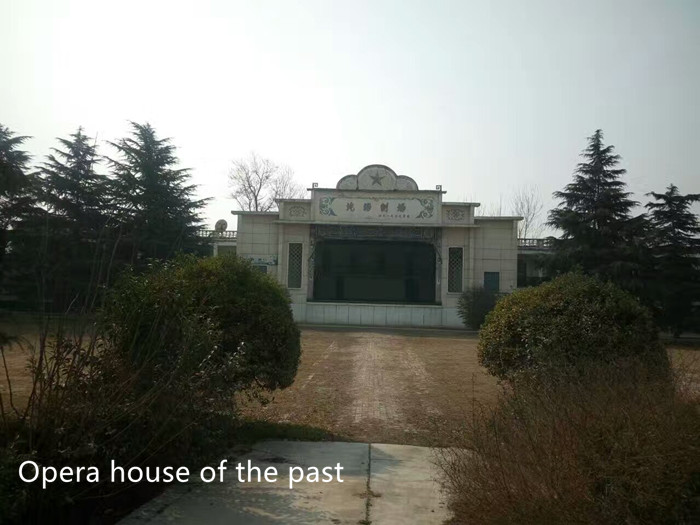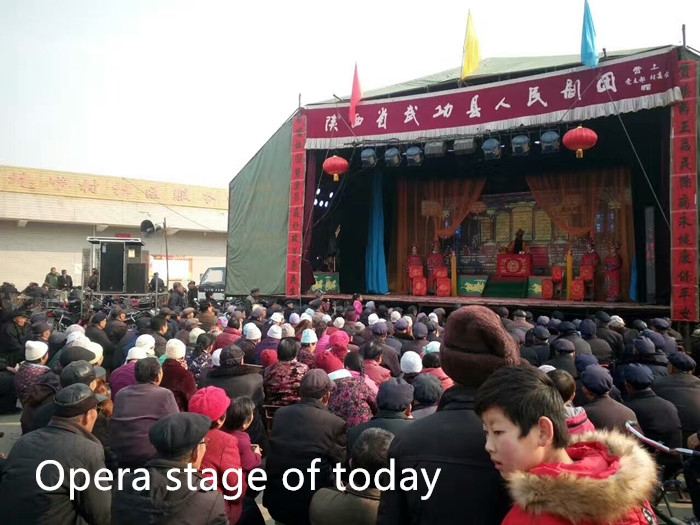The distance between today and yesterday
2017-02-26


After skimming a post that one of my friends uploaded to his WeChat Moments, I commented like this: “That time we would be going to your village to watch Qinqiang Opera (the main opera in Shaanxi province and even other provinces around it). The atmosphere was very good and lively. In fact, we didn’t go there to watch Qinqiang Opera, but to enjoy ourselves in the buzzing crowd. At the same time, we could eat a plate of Mianpi (noodle-like snack made of flour), and those who had enough money could ask the seller to add some pieces of beef into their plate. Moreover, we could join Labo (a small game of gamble) without spending much money (usually 0.1 yuan or a little more). It was of great fun. What a great joy of the past!” And he replied: “Yeah, happy memories.”
As far as I can remember, these memories happened when I was in primary school, about 18 years away from today. I have never truly realized this change until I read the post my friend mentioned in his Moments. He posted two pictures, with one showing the scene where Qinqiang Opera viewers sitting in front of today’s opera stage, and the other depicting the opera house which Qinqiang Opera performers once performed when I was young. Today’s opera stage was a temporary one, and the one which has been abandoned is an opera house, a permanent stage, made of bricks and concrete. The sad reality is now it is abandoned because of various reasons.
Nowadays in the rural areas of my hometown (Wugong County, Shaanxi Province) people who visit such places are all nearly seniors and children, and in fact, this reality is seen all over China. The joy of the past has been lost and the memories of long ago would never return. Since the past opera house has been left standing alone in that village, no one will visit that area to watch Qinqiang Opera during the traditional festival named Longtaitou (the dragon raises its head). So, the abandoned opera house becomes a loner.
Assume, the past opera house were still in use, what would happen now?
It is probably not as lively as it once was. It is easy to understand this awkward situation.
Firstly, only seniors and children can participate in this traditional event, and the population is small. Where have youths and middle-aged people gone? They have gone to big cities or faraway places to earn money for their families, and more and more country people are more willing to reside in cities rather than in rural areas, in the wake of urbanization and the change of idea. Staying at home seems to be hopeless for them.
Secondly, we have so much joy today that we don’t have to join such a traditional festival, where no thrilling or fascinating blockbusters and computer games can be found, and no online broadcastings can be watched. What one can only see in that area is nothing but a “dry” drama, which the youths even don’t understand at all. And the make-ups of these performers are not as attractive as they once were for us. I just search WeChat, Baidu, QQ News, or any other news source, and I can watch them free of charge without spending too much time and energy. It is so easy and simple. Why go there and see something “dry and old”? It is a story that has passed. Seniors and children cannot go so far away from home and can still maintain the tradition, which, in fact, has lost its popularity in modern times.
Today I have a computer, and this is very common, but it was like a piece of breaking news when I was young. I had the joy of getting my first computer in 2013, but the joy has no comparison with the happy memories when I hung around in front of that abandoned opera house. The joy of today is more about virtual reality, but the joy of the past is all about reality. I could buy a handgun toy with four yuan or so, I could buy some sugar cane with one yuan or two, I could buy a fluff of spun sugar (we call it cotton sugar), I could sit at a Mianpi stall, eating a plate of delicious Mianpi by only paying one yuan…
The past is the past, and will never return, although the good memories stay forever. Today our ways of enjoying living seem to be of great varieties, but our joy of living seems to be less than before. If not, why do we miss the joy of the past? From my point of view, today people work too hard and often forget their own joy of living because of financial requirements. Yesterday we didn’t have too much work to do and didn’t have to spend too much money, for, on one hand, many things were free, and on the other hand, our ideas towards living were simple and pure, and we were not so money-oriented as we are today. Now we forget our joy.
I am not sad about today’s life, but I seem to be attracted so much by the past good memories. Some think we should look forward to the future, but I think having some time to go back to your past memories can do you lots of good. Today is different from yesterday, so largely that I even haven’t realized that changes have happened in my life.
I was in Zhejiang when I saw a street opera like this. It was very interesting to see a Chinese opera on the street for free. There was a pretty big crowd there, but I could still see the play. It was days like this that made the Chinese culture so interesting to me. Unfortunately I didn't get to share it with anyone, this was before I used Wechat. I liked how you could enjoy special treats for only 1 or 2 yuan, and even gamble a little bit.
TRUSTED LENDER (LEXIELOANCOMPANY@YAHOO.COM)
My name is Michael Lee a citizen of Illinois, USA. i have been scammed by 7 different Internet international lender, they all promise to give me a loan after making me pay several fees which yield nothing and amounted to no positive result. i lost my hard earn money and it was a total of 23930USD. One day as i was browsing through the internet with tears on my eye i came across a testimony of man who was also scammed and eventually got linked to a legit loan company called MARTINEZ LEXIE LOAN COMPANY where he finally got his loan, so i decided to contact the same loan company and then told them my story on how i have been scammed by 7 different lenders who did nothing but to course me more pain. I explain to the company by mail and all they told me was to cry no more because i will get my loan in their company and also i have made the right choice of contacting them. I filled the loan application form and proceeded with all that was requested of me and to my greatest surprise my loan was granted to me without further delay and here i am today happy because Martinez Lexie Loan Company HAS GIVEN ME A REASON TO LIVE, so i made a vow to my self that i will keep testifying on the internet on how i got my loan. You are to contact this GODSENT LENDER via Email: Lexieloancompany@yahoo.com OR Text +18168926958
Tell you the truth, I am a Shaanxi native can speak Shaanxi dialect (guanzhong dialect), I cannot understand what the performers say on the stage. As a native Chinese, I am not interested in what they roar in high voices, but this is an art which I admire.
i am very interested in the performance style and tune of qinqiang. i think the artistic form of qinqiang gives me a straightforward feeling thought i can not understand what the performers sing for the reason of Shaanxi dialect.
thanks for sharing your story here, we would like to highlight it on the homepage.







Comment